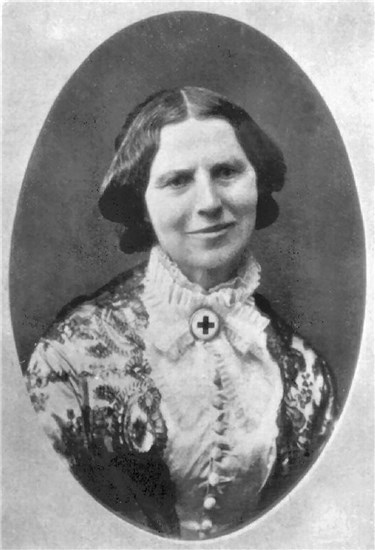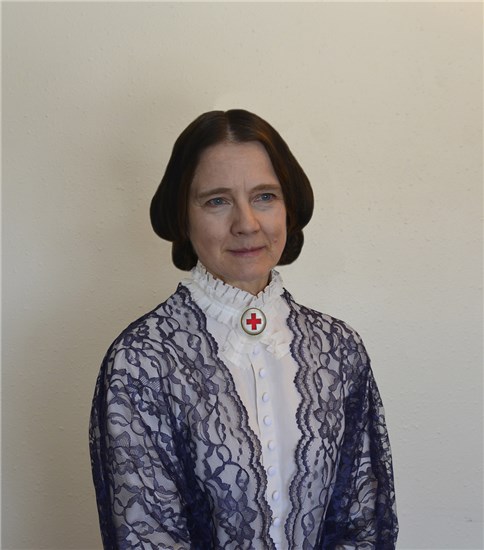

Clara Barton (1821-1912)
by Susan Marie Frontczak
Sponsored by North Colorado Medical Center / Banner Health
If “birth”refers to beginnings and “freedom” connotes absence of undue restraint, then both births and freedoms crisscrossed Clara Barton’s life again and again, but rarely crossed paths with each other. For starters, the year Clara was born in Massachusetts, 1821, the United States became a little less free, for Missouri joined the country as a slave state as a result of the Missouri Compromise.
From time to time Clara enjoyed transitory freedoms. As a girl she sneaked out to try forbidden ice-skating, a boys’ sport, only to be chastised for her disobedience. In her twenties shedemanded a full (man’s) salary as a teacher – and got it, though this was an individual battle rather than a victory for women as a whole. She started another school, grew it to 600 students, and then felt rebuffed when a man won the job of principal. She distinguished herself as a patent clerkin an exclusively male field, but had to put up with taunts and spit from male colleagues, and later was ousted by new management who didn’t cotton to the presence of a hoopskirt in a government office.
Clara and others pioneered the freedom for women to serve as wartime nurses, another male-only profession, but she had to bring a man along to the battlefield so as not to be considered a prostitute. Nevertheless the war proved a turning point whereby “nurse” eventually became a potential profession for a female.
Miss Barton gave birth to the first Missing-in-Action list, which she created and managed in the months following the Civil War.
Barton’s greatest freedom to fulfill her potential came as founder and 23-year President of the American Red Cross. She called the American Red Cross her “child,” a delivery requiring years of labor to convince Congress that it was in the interest of the United States to sign the international Treaty of Geneva. Along the way Clara conceived the idea that the Red Cross might serve not only in times of war, but also in the wake of natural disasters, an innovation subsequently adopted and promulgated by the international body. She generated the concept of First Aid, instituting classes, so that ordinary citizens might supply the same succor and life-sustaining care for a neighbor or stranger that she had learned to offer on the battlefield.
Meanwhile Clara watched one freedom spread: In her lifetime, through Jacksonian democracy, white men who were not landowners gained the vote. The 15th Amendment enfranchised African American males, at least by the letter of the law. Clara endorsed the newborn women’s suffrage movement, yet refrained from campaigning lest her “child” the American Red Cross be associated with radical ideas or written off as a ladies’ pastime.
Barton’s life ended before women attained the vote. But a quarter of a century after being banned from ice-skating, Clara watched her father helping his granddaughter (her niece) into skates. The hard-won freedoms she held most dear: to pursue a career, to be paid equitably for her labors, and to be respected for her accomplishments.
Recommended Reading
Barton, Clara. The Story of My Childhood. Baker & Taylor Company,1907.
Oates, Steven B.A Woman of Valor, Clara Barton and the Civil War. The Free Press,1994.
Pryor, Elizabeth Brown. Clara Barton, Professional Angel. University of Pennsylvania Press,1987.
Susan Marie Frontczak
Storysmith® Susan Marie Frontczak is in her twentieth year as a full time storyteller and thirteenth as a living history presenter, having given over 500 presentations as Marie Curie, Mary Shelley, Eleanor Roosevelt, and Irene Castle across 35 states, Canada, and Europe. This program marks her debut for Clara Barton. Susan Marie is also dedicated to helping others bring history to life. She has been coaching storytellers for 23 years, Young Chautauquans for 11, and adults Chautauquans for 6. She authored handbooks published by Colorado Humanities in 2008, one for teachers and one for coaches, to help Young Chautauquans discover how fun and engaging history can be. When bringing history to life, Susan Marie lives up to her motto, "Give me a place to stand, and I will take you somewhere else."
Clara Barton
-
Best known as the “Angel of the Battlefield” during the Civil War.
-
After the war, established and ran the “Office for Missing Soldiers,” the first "Missing in Action" list.
-
Established the American Red Cross.
-
Introduced the idea that the Red Cross could help not just at wartime, but also with natural disasters, such as hurricanes, earthquakes, epidemics, fires, and floods.
-
Founded the National First Aid Society, later absorbed by the Red Cross.
-
As a woman she: demanded equal pay as a teacher, and got it; became a renowned public speaker when a woman speaker was unheard of; served as the United States' first woman delegate to an international conference.
Quotes
“The patriot blood of my father was warm in my veins.”
“As a patriot [my father] bade me serve my country with all I had, even my life if need be; as the daughter of an accepted Mason, he bade me seek and comfort the afflicted everywhere, and as a Christian he charged me to honor God and love mankind.”
“I want to go to the front.”
"My business is staunching blood, and feeding fainting men."
“I have chosen my own position . . . to stand by the soldier between the bullet and the city hospital.”
“[A] bullet sped its full and easy way between us, tearing a hole in my sleeve and found its way into his body.”
“It has long been said, that women don't know anything about war. I wish men didn't either. They have always known a great deal too much about it for the good of their kind."
“They showed me wounds they said I had helped to heal, and stumps of limbs they said I had tried to save, and they clustered around me like loving boys and I—I cried and they cried too.”
"To this day, I would rather stand behind the lines of artillery at Antietam or cross the pontoon bridge under fire at Fredericksburg, than to be expected to preside at a public meeting."
[Handouts of food] “would make of them permanent beggars and vagrants, thus doing for their morale all that the bombardment had done for their physical condition.”
“Through all the past years, during which the Red Cross has sought recognition, protection and co-operation, it was but for one purpose—to be ready.”
“[T]he humanity of peoples is far beyond that of governments. Governments appropriate immense sums to carry on destructive conflicts, but the work of relief societies the world over . . . has shown that the philanthropy of the people equals their patriotism.”
“History has recorded the sufferings, the horrors of misery that accompanied and followed that siege; but history can never relate what wretchedness was averted, what agonies were alleviated, what multitudes of lives were saved, by the presence and effort of the relief societies.”
“It may appear singular that a movement so humane in its purposes, so wise and well considered in its regulations, so universal in its application, and every way to unexceptional, should have been so long in finding its way to the knowledge and consideration of the people of the United States.”
"I may sometimes be willing to teach for nothing, but if paid at all, I shall never do a man's work for less than a man’s pay."
“[My] own entire-earnest-heartfelt-ever before and ever-after sympathy and cooperation . . . to the thousands constantly going up for the early and complete enfranchisement of my sex, and the admission of women of whatever race to all the rights and privileges . . . which as an intelligent human being belongs to her.”
“There have been great women in all ages, but never an epoch when all women were so great . . . Women begin to dare to do, aye, dare be, even, for the time has been when the ordinary woman scarcely felt that this belonged to her.”
“Man is trying to carry the burdens of the world alone. When he has the efficient help of woman he shouldbe glad, and he will be. Just now it is new and strange, and men cannot comprehend what it would mean. But when such help comes, and men are used to it, they will be grateful for it. The change is not far away. This country is to know woman [sic] suffrage, and it will be a glad and proud day when it comes.”
“I thought that night, if heaven ever sent out a homely angel she must be one, her assistance was so timely.” —Dr. James L. Dunn, Civil War surgeon
“[She is] the true heroine of the age, the angel of the battlefield.” —Dr. James L. Dunn, Civil War surgeon
“She is the American Florence Nightingale & has without a doubt seen more battlefields than any American woman.” —Lieutenant Colonel John J. Elwell
“It was as if this gifted woman found our heartstrings and was skillfully playing a sad minor hymn upon them.” —Reporter, describing Clara Barton’s lectures after the war.
“In time of peace and prosperity, prepare for war and calamity.”—Motto of the Red Cross
Timeline
1821 Born in North Oxford, MA, the youngest of five children
1839-53 Teaches school, various districts, including free school for millworkers’ children
1854-56 Works in Patent Office, Washington D.C.
1861-65 Serves wounded soldiers in the Civil War, is dubbed the Angel of the Battlefield.
1864 The International Red Cross forms in Geneva (unbeknownst to Clara)
1865 Creates missing soldier list and visits Andersonville
1866-68 Travels the U.S. lecture circuit
1869-71 Travels to Europe to recover from exhaustion and depression and discovers the Red Cross.
1881 Founds the American Red Cross and becomes president, 1882 ratified by Congress
1904 Resigns from the Red Cross amidst controversy
1905 Establishes the National First Aid Association of America
1909 First Aid training is absorbed by the American Red Cross
1912 Dies in Glen Echo, MD